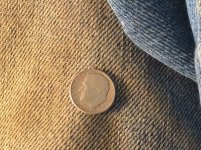Timebandit
Jr. Member
Guys,
I was out for several hours today and broke a silver drought with a ‘46 Rosie at about 8” on a bouncy iffy signal on the Etrac. I hit a 12-45 once in my swings but mostly bounced with only a few 45’s. I dug it and new it was silver as soon as my pin pointer placed it in the center of the hole. Question... can you guys tell me the average depth of your silvers and what type of dirt your digging? I pulled this one at 8” in black soil but my usual silvers come in about 4”-6” and most of that is in clay under an Inch or 2 of topsoil.

I was out for several hours today and broke a silver drought with a ‘46 Rosie at about 8” on a bouncy iffy signal on the Etrac. I hit a 12-45 once in my swings but mostly bounced with only a few 45’s. I dug it and new it was silver as soon as my pin pointer placed it in the center of the hole. Question... can you guys tell me the average depth of your silvers and what type of dirt your digging? I pulled this one at 8” in black soil but my usual silvers come in about 4”-6” and most of that is in clay under an Inch or 2 of topsoil.

Last edited:
Upvote
0










